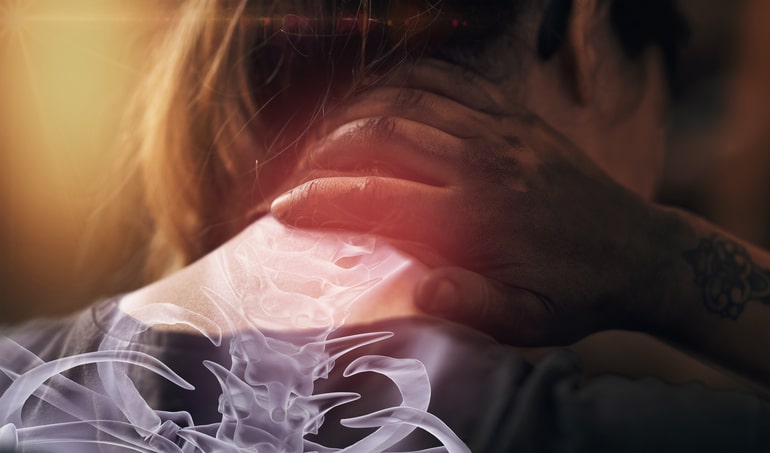Get Our Insider to Property Damage Brochure

How North Carolina Accidents Impact the Body: Common Neck Injuries, Causes & Treatments
March 21, 2024At Dewey, Ramsay & Hunt, P.A., our Charlotte personal injury lawyers, with their extensive experience handling neck injury cases, understand that these injuries can occur in various accidents. Depending on their severity, they often necessitate long-term medical care and extended time away from work to ensure a proper recovery.
Here, our North Carolina personal injury attorneys discuss the accidents that lead to common neck injuries and potential treatments available to injury victims.
Common North Carolina Personal Injury Accidents That Cause Back Injuries
Neck injuries can result from various types of personal injury accidents, but some are more common than others.
They include, but are not limited to:
- Car Accidents
Car accidents are a leading cause of neck injuries due to the forces involved in collisions. Whiplash, a common neck injury, occurs when the head suddenly jerks backward and forward, straining the neck muscles and ligaments, which are particularly associated with rear-end collisions.
- Slip and Fall Accidents
Slip and fall accidents can result in neck injuries, particularly if the individual lands on their head or neck. Falling onto hard surfaces such as concrete or pavement can cause strains, sprains, fractures, or other soft tissue injuries to the neck.
- Motorcycle Accidents
Motorcycle accidents can result in neck injuries due to the lack of protection for riders. Injuries such as whiplash and cervical spine fractures are common in motorcycle accidents, particularly in high-speed crashes or collisions with other vehicles.
- Pedestrian Accidents
Pedestrians struck by vehicles can suffer neck injuries, especially if they are thrown onto the hood or windshield of the car or the pavement. These injuries can range from whiplash to more severe cervical spine injuries.
- Recreational Accidents
Boating, cycling, or ATV riding can also lead to neck injuries. Collisions falls, or being thrown from a vehicle or equipment can cause strains, sprains, fractures, or more severe cervical spine injuries.
Regardless of the type of accident, if you suspect a neck injury, seek medical attention promptly. Early diagnosis and treatment can help prevent further complications and improve outcomes.
Common Neck Injuries Resulting from North Carolina Personal Injury Accidents & Potential Medical Treatment Methods
Personal injury accidents can result in various types of neck injuries, each with its own set of symptoms and potential treatment methods.
Some common neck injuries resulting from personal injury accidents in North Carolina and possible medical treatment methods include, but are not limited to:
- Whiplash
Whiplash occurs when the head is forcefully jerked backward and then forward, straining the neck’s soft tissues. Symptoms of whiplash may include neck pain, stiffness, headaches, dizziness, and difficulty moving the neck.
Treatment typically involves rest, pain medication, applying ice or heat, gentle stretching exercises, physical therapy, and possibly wearing a cervical collar for support.
- Cervical Strain or Sprain
Strains and sprains of the cervical spine (neck) can occur due to sudden movements or trauma, like those experienced in car accidents or slip-and-fall incidents. These injuries involve stretching or tearing the neck muscles or ligaments.
Treatment may include rest, over-the-counter pain medication, ice or heat, gentle stretching exercises, physical therapy, and wearing a cervical collar for support.
- Cervical Disc Herniation
A cervical disc herniation occurs when the soft inner core of a spinal disc protrudes through the more rigid outer layer and presses on nearby nerves in the neck. This can cause neck pain, arm pain, numbness, tingling, and weakness.
Treatment options may include rest, pain medication, physical therapy, epidural steroid injections, or, in severe cases, surgery such as Anterior Cervical Discectomy and Fusion (ACDF).
- Cervical Fractures
Fractures or breaks in the bones of the cervical spine can occur due to high-impact accidents such as car crashes or falls from heights. Symptoms may include severe neck pain, swelling, bruising, difficulty moving the neck, and, in some cases, neurological symptoms such as weakness or numbness in the arms or legs.
Treatment depends on the severity of the fracture but may involve immobilization with a cervical collar, pain management, bracing, or surgery to stabilize the spine.
- Cervical Spinal Cord Injury
Severe trauma to the cervical spine can result in a spinal cord injury, which can lead to partial or complete paralysis, loss of sensation, and impaired bodily functions.
Treatment may involve emergency medical care, immobilization of the spine, surgery to decompress the spinal cord or stabilize the spine, rehabilitation, and ongoing medical management.
- Facet Joint Injury
Facet joints are small joints between adjacent vertebrae in the spine. Injury to these joints, such as from trauma in accidents, can cause neck pain, stiffness, and restricted movement.
Treatment may include rest, pain medication, physical therapy, facet joint injections, or, in some cases, radiofrequency ablation to disrupt the nerves supplying the facet joints.
If you have been involved in a personal injury accident and suspect you have suffered a neck injury, seek medical attention immediately. A thorough evaluation by a medical professional can help diagnose the extent of the injury and guide appropriate treatment.
Have You Suffered a Neck Injury in a North Carolina Accident?
If you suffered a neck injury in an accident caused by negligence in North Carolina, our personal injury attorneys in Charlotte at Dewey, Ramsay & Hunt want to hear your story during a free consultation by calling (704)-377-3737 or contacting us online.
We provide unique legal services tailored to each client’s needs and do not get paid unless you do.
Your Injury, Our Fight. How can we help you take a stand?
Because every case is different, the description of awards and issues previously managed by our law firm does not guarantee a similar outcome in current or future cases.

